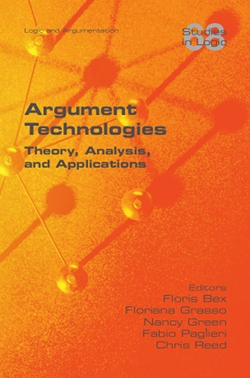 | Argument Technologies
Theory, Analysis, and Applications
Edited by Floris Bex, Floriana Grasso, Nancy Green, Fabio Paglieri and Chris Reed
Argument technologies started a few decades ago as a sub-field of Artificial
Intelligence, in which philosophical theories of arguments were leveraged to
handle key computational challenges, such as the modelling of non-monotonic
reasoning and the design of robust coordination protocols among large
numbers of autonomous agents. This soon led to several theoretical
breakthroughs, which in turn fostered the development of argument-based
applications in a variety of domains, e.g., education, healthcare, policy
making, and risk management. As a result, argument technologies have now
become a thriving interdisciplinary enterprise, with its own variety of
sub-fields and methodologies. This volume offers an updated overview of the
current state-of-the-art in this research area, looking at both novel
theoretical insights (Part I), new applications specifically tailored for
the Social Web (Part II), and innovative tools designed to serve key
purposes in various domains (Part III).
1 October 2017
978-1-84890-218-3
|

